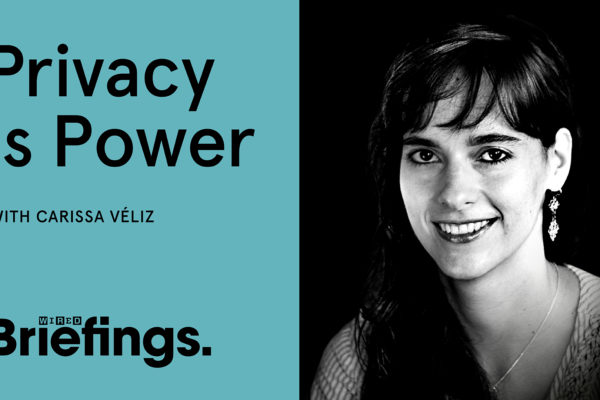Privacy is Power: The true extent of data tracking in society today
At a recent Wired briefing, Carissa Véliz, Associate Professor in Philosophy at the Institute for Ethics in AI at Oxford University, spoke about what she calls the ‘really unwise’ use of personal data going on in the world today. Titled ‘Privacy is Power’ after Véliz’s September 2020 book of the same name, the session looked at just how deeply entrenched in our lives data tracking has become, and what it might potentially take to unravel the situation.
“I’ve been researching privacy for about 6-7 years now, and I was extremely unsatisfied with the kinds of books I was reading,” Véliz told Wired Editor-in-Chief, Greg Williams at the virtual event. “Some of them were very good but only about one aspect, most of them were very theoretical or very technical, and the more I read about the topic the more I grew alarmed about the state of the situation.”
“What we’re doing is really unwise, to put it very mildly. And I thought the time was perfect for writing a book that was extremely accessible to everyone, even if you’ve never heard anything about privacy in tech. It’s very easy even for experts to forget about certain things, because data is very abstract. Yes, you know your data is being collected – but what does that mean?”
The examples she gives to answer this question are startling – the smart-car that tracks not only location and journey time, but also the music tracks listened to along the way and your daily weight as measured by your seat; or the audio-beacons that track your entire purchase behaviour, from hearing an ad on the radio in the morning, to walking into a store in the local vicinity to buy said product in the afternoon.
Certainly the digital advertising sector has a lot to answer for when it comes to the erosion of privacy online. As Véliz states, “Companies want to know who you are and that you own a particular laptop, and a particular phone, and that you live somewhere.”
We recently looked at the current state of the digital advertising industry today, and in particular how Apple’s latest iOS update signifies a game changer when it comes to the free-for-all we have previously seen in terms of tracking people’s behaviour across different apps and sites. It’s no surprise for example that Facebook is especially concerned about Tim Cook’s clampdown on third-party tracking, when the company has built an entire business model on knowing exactly what content to serve you on a daily basis.
This algorithmic approach to content delivery was also recently the subject of wider scrutiny on Capitol Hill, when senators grilled Facebook, Twitter and YouTube on its application of these practices on their platforms. While there is nothing inherently wrong with using algorithms or machine learning, the companies were told, something has gone astray in the way these techniques are being leveraged.
But of course, the situation today goes far beyond the intrusiveness of ads and according to Véliz, has deep reaching and potentially dangerous repercussions for our society going forward. When behavioural data can be used to sway the results of an election for example, questions need to be asked. Often, such data is not necessarily precise enough to paint a true, personalised picture of an individual, but carries just enough insight to be able to encourage slight influences en masse.
Nonetheless, just as Apple’s latest software update has provided something of a wakeup call for the industry, so too this moment in our history can be a wider tipping point for the way society approaches the issues of data and privacy at large.
“In a sense, I’m really optimistic because I think this state of affairs is unsustainable,” says Véliz. “It’s like the Wild West and it’s going to come crashing down. I’m hoping that we manage to regulate it before something really bad happens, like genocide in the West or something like that. If we implement these changes, on the one hand superficially things don’t look that different. We can have cutting edge tech, we can have appliances and all kinds of things. But underneath it all, data is not collected by default, you have to sign up, and even then there are certain kinds of personal data that you are not allowed to give out.”
You can watch the interview in full over on Wired here.









